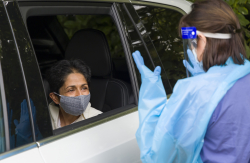Armed with a $1 million award from the National Institutes of Health, universities and health care entities throughout the state of Florida are collaborating to provide outreach and engagement to ethnic and racial minority communities disproportionately affected by the COVID-19 pandemic.
Led by population health experts and physicians with the University of Miami Miller School of Medicine, the effort titled “Community Engagement Alliance Against COVID-19 Disparities” or the Florida CEAL Team, includes a diverse group of experts at the University of Florida, Florida International University, Florida A&M University, Moffitt Cancer Center and Health Choice Network.
Both the University of Florida and the University of Miami are part of the OneFlorida Clinical Research Consortium, a statewide network of academic health systems, hospitals and clinics established in 2015 to help facilitate and accelerate health research in Florida.
“We are privileged to lead a coalition that will address one of our state’s most pressing public health concerns,” said the project’s principal investigator Olveen Carrasquillo, M.D., M.P.H., professor, department of medicine and public health aciences, and chief of the division of general internal medicine at UM. “Disparities in COVID-19 infections are a concern, as African Americans, Hispanics and Native Americans account for more than half of all reported cases in the United States. We want to counteract misinformation about COVID-19, understand barriers to care, and promote minority participation in vaccine and therapeutic clinical trials.”
Researchers attribute elevated COVID-19 prevalence and mortality rates in underserved communities to structural inequalities and social determinants of health. Working with community organizations, the Florida CEAL Team will develop community-based outreach activities aimed at promoting evidence-based COVID health promotion practices and participation in clinical trials. They will also implement and evaluate the impact of strategies that increase the enrollment of minorities into COVID vaccine and therapeutic trials.
“We know that this virus does not discriminate,” said Folakemi Odedina, Ph.D., a professor of pharmacotherapy and translational research at the UF College of Pharmacy and a director of the CaRE2 Health Equity Center. “We also know that COVID-19 significantly impacts minority communities. Joining together with our collaborators around the state to support some of the hardest-hit communities is a crucial step in achieving our common goal of eradicating coronavirus in Black and Latinx communities.”
Elizabeth A. Shenkman, Ph.D., chair of the department of health outcomes and biomedical informatics in the UF College of Medicine, said the statewide network of health systems, hospitals and clinics was able to quickly mobilize to provide outreach and resources for these communities, especially those with limited access to health care services and support for COVID-19.
“When the pandemic hit, many of Florida’s minority and ethnic communities were already coping with serious health disparities, including higher rates of cancer, obesity, diabetes, hypertension and heart disease,” said Shenkman, who is also the principal investigator of the OneFlorida Clinical Research Consortium. “COVID-19 added one more.”
Projects by site are as follows:
University of Florida:
UF will be involved in two projects. The CaRE2 Health Equity Center at UF will coordinate COVID-19 outreach efforts to some of the hardest-hit communities in North and Central Florida, including Alachua, Duval, Lake, Orange, Osceola and Seminole counties. As the coordinating center for the OneFlorida Clinical Research Consortium, UF will also work to increase minority enrollment in its COVID-19 clinical trials.
University of Miami Miller School of Medicine:
UM will be involved in two projects. The Center for Latino Health Research Opportunities will work with investigators at FIU to promote evidence-based COVID prevention practices. UM researchers will also work to boost minority enrollment in the multiple COVID-19 vaccine clinical trials that UM is leading in South Florida.
Health Choice Network:
HCN will examine the barriers and facilitators among HCN patients for participation in COVID-19 research studies and the perceptions among providers about having their patients participate in such studies. HCN will also promote and facilitate the participation of patients in COVID-19 studies at UM.
This story was originally posted on UF Health.
Check out more stories about UF research on COVID-19.

